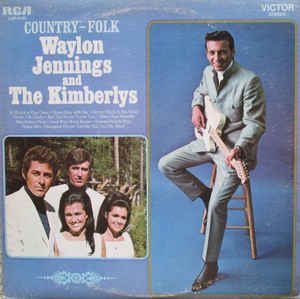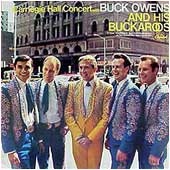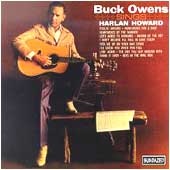Harlan Perry Howard was an American songwriter, principally in country music. In a career spanning six decades, Howard is credited with writing more than 4,000 songs, over 100 of which reached country music's Top 10.
"Heartaches by the Number" is a popular country song written by Harlan Howard, and published in 1959. The sheet music was a best seller in both the US and Britain in January 1960.

Leavin' Town is the second studio album by American country music artist Waylon Jennings, released in 1966 via RCA Victor. It peaked at #3 on the Billboard country albums chart.

Nashville Rebel is the third studio album by American country music artist Waylon Jennings, released in December 1966 via RCA Victor. It reached #4 on the Billboard country albums chart.

Love of the Common People is a 1967 album by American country music artist Waylon Jennings, released on RCA Victor.

Only the Greatest is a studio album by American country music artist Waylon Jennings, released in 1968 on RCA Victor. It includes the single "Only Daddy That'll Walk the Line," which Jennings took to #2 on the country music charts that year.

Country-Folk is a studio album by American country music artist Waylon Jennings featuring the Kimberlys on vocals. It was released in 1969 on RCA Victor.

Waylon is a studio album by American country music artist Waylon Jennings, released in 1970 on RCA Victor.

Lonesome, On'ry and Mean is a studio album by American country music artist Waylon Jennings, released on RCA Victor in 1973. It was, after Good Hearted Woman and Ladies Love Outlaws, the third in a series of albums which were to establish Jennings as one of the most prominent representatives of the outlaw country movement. Like its successor, Honky Tonk Heroes, the album is considered an important milestone in the history of country music. It represented the first of Jennings' works produced and recorded by himself, following his fight for artistic freedom against the constraints of the Nashville recording establishment.

Honky Tonk Heroes is a country music album by Waylon Jennings, released in 1973 on RCA Victor. With the exception of the final track on the album, "We Had It All", all of the songs on the album were written or co-written by Billy Joe Shaver. The album is considered an important piece in the development of the outlaw sub-genre in country music as it revived the honky tonk music of Nashville and added elements of rock and roll to it.

Dreaming My Dreams is the twenty-second studio album by American country music artist Waylon Jennings. The album was co-produced with Jack Clement and recorded at Glaser Sound Studios in Nashville, Tennessee, between February and July 1974.

Wanted! The Outlaws is a compilation album by Waylon Jennings, Willie Nelson, Jessi Colter, and Tompall Glaser, released by RCA Records in 1976. The album consists of previously released material with four new songs. Released to capitalize on the new outlaw country movement, Wanted! The Outlaws earned its place in music history by becoming the first country album to be platinum-certified, reaching sales of one million.

I've Always Been Crazy is a studio album by American country music artist Waylon Jennings, released on RCA Victor in 1978.

What Goes Around Comes Around is a studio album by American country music artist Waylon Jennings, released on RCA Victor in 1979.

Nashville Rebel is a box set by Waylon Jennings, released on RCA Nashville through Legacy Recordings in 2006. According to AllMusic's Stephen Thomas Erlewine, it is "the first comprehensive, multi-label Waylon Jennings retrospective ever assembled," comprising ninety-two songs recorded between [1958 and 1994, with selections from the majority of the singer's recording career. The first track of the box set is the Buddy Holly-produced "Jole Blon," released in 1958, while the last is "I Do Believe," a song produced by Don Was that was included on The Highwaymen's 1995 release, The Road Goes On Forever. The other material on the box set covers Jennings' career chronologically, with songs ranging from his years on RCA's roster to later compositions from his short-lived stay at Epic Records; it ignores, however, the tracks from Jennings albums released on independent labels. The majority of the singer's charting singles are included in the package, as are collaborations such as "Mamas Don't Let Your Babies Grow Up to Be Cowboys" with Willie Nelson and "Highwayman" with The Highwaymen. A notable addition is the previously unreleased "The Greatest Cowboy of Them All," a 1978 duet with Johnny Cash which was later recorded by Cash alone for A Believer Sings the Truth (1979) and The Mystery of Life (1991); two others, "It's Sure Been Fun" and "People in Dallas Got Hair," had never been released in the United States. Nashville Rebel was released on four CDs, with a 140-page booklet and liner notes by Rich Kienzle and Lenny Kaye.

Carnegie Hall Concert is a 1966 album by the Country band Buck Owens and his Buckaroos. The album was recorded live at Carnegie Hall, as Buck Owens and his Buckaroos became the second country band ever to perform there.

Dwight Sings Buck is country music artist Dwight Yoakam's 17th studio album, and a tribute album to Buck Owens. The album was released on October 23, 2007, by New West Records.

"I've Got a Tiger By the Tail" is a song made famous by country music band Buck Owens and the Buckaroos. Released in December 1964, the song was one of Owens' signature songs and showcases of the Bakersfield sound in the genre. In 1999, the song was inducted into the Grammy Hall of Fame.

Buck Owens Sings Harlan Howard is an album by Buck Owens, released in 1961.

Ralph Eugene Mooney was an American steel guitar player and songwriter, he was inducted into the Steel Guitar Hall of Fame in 1983. He was the original steel guitarist in Merle Haggard's band, The Strangers and Waylon Jennings's band, The Waylors.


















